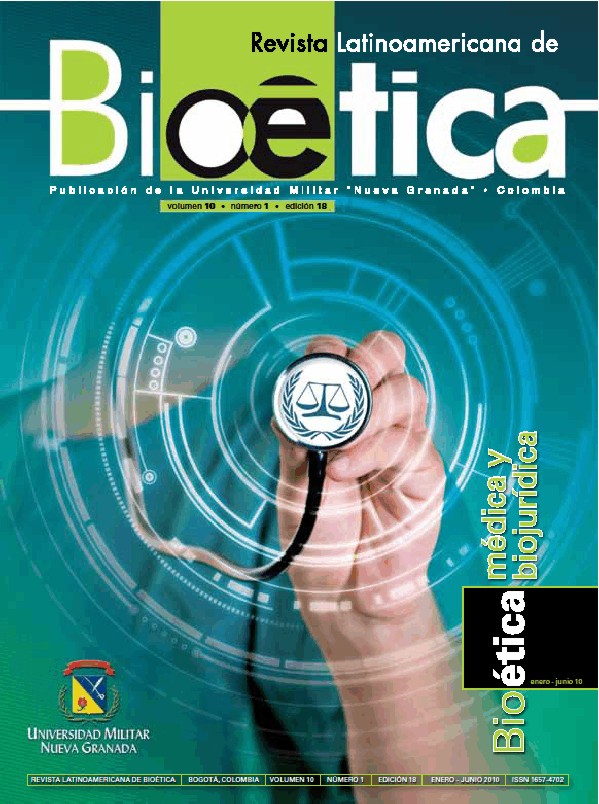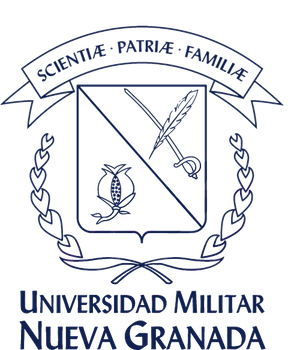Legislación comparada en bioética India, La tierra de los paradigmas
Resumen
Este artículo presenta una visión breve sobre algunos temas relevantes de bioética en la India, que como todos saben es de los países que ocupan los primeros puestos en tráfico de órganos del mundo. Trataremos temas de relevancia como la eutanasia, el aborto y la legislación en biotecnología, entre otros temas. India es un país de contradicciones debido a la exhuberancia y belleza de sus tierras, así como a sus tradiciones espirituales milenarias. En contraste, la enorme pobreza de sus millones de habitantes, que su gran mayoría viven en condiciones de indigencia extrema, lleva a que muchos de ellos sirvan de “conejillos de indias” para experimentos de multinacionales a cambio de unas cuantas rupias.
Descargas
Disciplinas:
Bioética, humanidades, ciencias socialesLenguajes:
esReferencias bibliográficas
• ABOUNA, G. (2008, Jan-Feb). Organ shortage crisis: problems and possible solutions. Transplant Proc., 40(1), 34-8.
• ALONSO B EDATE, C.Y. y MAYOR Z ARAGOZA, F. (Coord.). (2003). Gen-Ética, Barcelona: Editorial Ariel.
• ANTISERI, D. (1972), El problema del lenguaje religioso, Madrid: Cristiandad.
• BHALLAÇ, S. (2009, Jan). Child dead, broke father struggle to clear dues. The Hindustan Times (Chandigarh Ed.), 1:3 (Col.6).
• CABRÉ P ERICàS, L. (Coord.). (2003). Medicina Crítica Práctica, Decisiones Terapéuticas al final de la vida, Barcelona: Editorial Edika Med.
• CAILLOIS, R. (1984), El hombre y lo sagrado, México: FCE.
• CARVALHO, N.P. (2009, 25 Nov). Requiring disclosure of the origin of genetic resources and prior informed consent in patent applications without infringing the TRIPS agreement: the problem and the solution, from: http://law.wustl.edu/journal/2/p371carvalho.pdf
• CASADO, M. (1998). Public Health Requirements And The Safeguarding Of Human Dignity. (Ed). European Association Of Global Bioethics. Florencia-Bruselas:
• CASADO, M. (2004). Las Leyes De La Bioética. Barcelona: Ed. Gedisa.,
• CASADO, M. (2009). Sobre la Dignidad y los Principios. Análisis de la Declaración Universal de Bioética y Derechos Humanos de la UNESCO. Navarra: Ed. Civitas.
• CASCIANO, L. y F IUSELLO, F. (2006). Italy`s take on biotech issues. Managing Intellectual Property, 224-36.
• CHUGH, K.S. y JHA, V. (2000). Problems and outcomes of living unrelated donor transplants in the developing countries. Kidney International, 57(Suppl 74), S131-S135.
• COULTER M. Property in Ideas: the patent question in mid-Victorian Britain. (1991). Missouri: Thomas Jefferson University Press.
• CYRANOSKI, D. (2008, Oct 2). Hwang work granted patent: Australia criticized for issuing a patent for a method the Korean lied about using. Nature, 455 (7213), 571.
• DEVAIAH, V.H. (2007). TRIPS flexibilities. In: Ashiya M, (Ed). TRIPS and global pharmaceutical industry: perspectives and implications. Hyderabad (India): ICFAI University Press.
• DEY, A. (2009, Jun 5). Education and corruption. Asian Correspondent. From: http://us.asiancorrespondent.com/atanu-deyblog/2009/06/05/education-and-corruption
• DRAHOS, P.A. (1996). Philosophy of intellectual property. Aldershot (UK): Dartmouth Publishing Company Ltd.
• ELIADE, M. (1978 - 1983), Historia De Las Ideas Y Creencias Religiosas (Vol. IV). Madrid: Cristiandad.
• THARIEN, A.K. (1995, March). Euthanasia in India. Eubios Journal Of Asian And International Bioethics, 5(2), 33-35.
• FARHAT, M. (2000, Nov-Dec). Families, patients and physicians in medical decisionmaking: a Pakistani perspective. Hastings Cent Rep, 30(6), 28-37.
• FATAH, S. (2008, Feb 16). Indian officers charged in kidney scandal February. The Star.com. From: www.thestar.com/News/World/article/304157
• FOX RENEE, C. (1988). Organ transplantation: sociocultural aspects. In: Essays in medical sociology: journeys into the field. New Brunswick, (pp. 115-21), New Jersey: Transaction Books.
• FREEDMAN, B.A. (1975, Aug). Moral theory of informed consent. Hastings Center Report, 5(4), 32-9.
• GARCÍA M ANRIQUE, R., La Medida De Lo Humano. Ensayos De Bioética Y Cine. Barcelona: Ed.Observatori De Bioètica I Dret - Associació De Bioètica I Dret, Pcb-Ub.
• GHOSH, S. (2005). Patents and the regulatory state: rethinking the patent bargain metaphor after Eldred. Berkeley Technol Law J, 19(4), 1315-88.
• GMCH employee in CBI net. (2009, 21 May). The Tribune Chandigarh. (p. 2, col. 3). Available from: http://www.tribuneindia.com/2009/20090203/cth2.htm
• GOLD, E.R. y C AULFIELD, T.A. (2002). The moral tollbooth: a method that makes use of the patent system to address ethical concerns in biotechnology. Lancet, 359(9325), 2268-70.
• GOLDMAN, A. (1989). Ethical Issues in Proprietary Restrictions on Research Results. In: Weil V, Snapper J, (Eds). Owning Scientific and Technical Information. New Brunswick (USA): Rutgers University Press.
• GOLDSTEIN, J. (1975). For Harold Laswell: some reflections on human dignity, entrapment, informed consent and the plea bargain. Yale Law J, 84(4), 683-703.
• GÓMEZ, J. (Edit.) (1993). Religión. Madrid: Trotta.
• GÓMEZ, J. y M ARDONES, J.M. (Edit.). Materiales Para Una Filosofía De La Religión (Vol. I. Vol. II. Vol. III). Barcelona: Anthropos.
• GRUBB, P.W. (2004). Patents for Chemicals, Pharmaceuticals and Biotechnology: Fundamentals of Global Law, Practice and Strategy. Oxford: Oxford University Press.
• GUERRA, Y. (2010). Liderazgo. Una Propuesta Pedagógica Eficaz. Bogotá, Colombia: Universidad Militar Nueva Granada.
• HANSSON, H.G. (2007). Respect for the individual as a person with moral and political authority - integrity from a philosophical perspective. Philosophical Studies in Contemporary Culture, 15, 71-89.
• HEGEL, G.W.F. (1984). Lecciones Sobre Filosofía De La Religión (Vol. III). Madrid.
• HEYD, D. (2009, 25 Nov). Genethics: Moral Issues in the Creation of People. Berkeley: University of California Press. Available from: http://www.escholarship.org/editions/view?docId=ft309nb1nd&brand=ucpress
• HUME, D. (1974). Diálogos Sobre La Religión Natural. Salamanca: Sígueme.
• India Gazzette. (2007, 25 De Abril).
• India kidney trade. (2009, 21 May). TED Case Studies; Case number 240. Available from: http://www1.american.edu/TED/KIDNEY.HTM
• Manual of patent practice and procedure (draft) (2005). Available from: http://www.patentoffice.nic.in/ipr/patent/manual-2052005.pdf
• JONES, A.W. (2001). Patenting rDNA: human and animal biotechnology in the United Kingdom and Europe. Witney, Oxon
• (England): Lawtext Pub.
• JONES, A.W. (2007). Vital parameters for patent morality- a question of form. Journal of Intellectual Property Law & Pract, 2(12), 832-46.
• JYOTHI, P.T. (1995). Where kidney donation is a cottage industry. The Indian Express, 1(col.1).
• KAUSHIK, J. (2009, Jul-Sep). Organ transplant and presumed consent: towards an “opting out” system. Indian J Med Ethics, 6(3), 149-152.
• KHERGAMKER, G. (2007), Thoughts To Inspire And To Celebrate, Mumbai, India: Jaico Publishing House. Kidney donor alleges fraud by doctors. (s.f.). Bio-Medicine. Available from: http://www.bio-medicine.org/medicine-news/Kidney-Donor-Alleges-Fraud-by-Doctors-22445-1/
• KUFLIK, A. (1989). Moral Foundations of Intellectual Property Rights. In: Weil V, Snapper J, (Eds). Owning Scientific and Technical Information. New Brunswick (USA): Rutgers University Press.
• LACASA, C.; HUMET, C. y C OT, R. (2001). Errores De Medicación: Prevención, Diagnóstico Y Tratamiento. En: M. Casado. Errores De Medicación: Reflexiones Desde La Bioética (pp. 39-45). Barcelona: Editorial EASO
• LOONEY, B. (1994). Should genes be patented?. Law and Policy in International Business, 26(1), 231-72.
• MACHIAH, M.G. (1995). Senior politicians, cops collude to bury kidney scam. The Indian Express, 9(col.13).
• YOUNG, E. (2005, Octubre 21). Laws fail to stop india’s organ trade. Magazine New Scientist, 188(2522), 20.
• MAKKAR, S. (2008). Gurgaon kidney scam or Nithari murders, apathy was same. Recuperado el 31 de Agosto de 2009. Disponible en: http://news.boloji.com/2008/02/17157.htm
• Managing intellectual property. (2008). EPO rejects WARF stem cell patent. Recuperado el 25 de Noviembre de 2009. Disponible en: http://www.managingip.com/Article.aspx?ArticleID=2059365
• MARTINS-COSTA, J. y LUDWIG MöLLER, L. (Orgs.) (2008). Bioética E Responsabilidade. Río De Janeiro, Brasil: Ed. Forense.
• MÉNDEZ BAIGES, V. (2002). Sobre Morir: Eutanasias, Derechos, Razones, Madrid: Editorial Trotta.
• MITTAL, R. (2008, Apr 21). Corruption roko. In: Corruption Report On Karmayog Online. Recuperado el 31 de Agosto de 2009. Disponible en: http://www.karmayog.org/roko/roko_14866.htm
• OMAN, R. (1995). Biotech Patenting issues raise ethical concerns. The National Law Journal, 17(36), C42.
• OTTO, R. (1980). Lo Santo. Madrid: Alianza.
• POTTER, C. (2003). Corruption mars India`s healthcare system. Express Health care Management. Recuperado el 27 de Agosto de 2009. Disponible en: http://www.expresshealthcaremgmt.com/20030115/comment1.shtml
• RESNIK, D.B. (2004). Owning the Genome: A moral analysis of DNA patenting. New York: State University of New York Press. Ricoeur, P. (1969). Finitud y Culpabilidad. Madrid: Taurus.
• ROMERALES, E. (Edit.). (1992). Creencia y Racionalidad. Barcelona: Anthropos.
• SADABA, J. (2004). Principios de Ética Laica. Barcelona: Ed. Gedisa.
• SHARMA R. (2001, Dec 15). Head of Medical Council of India removed for corruption. Recuperado el 21 de mayo de 2009. Disponible en: http://www.bmj.com/cgi/content/extract/323/7326/1385
• SIMINOFF, L.A.; BURANT, C.J. y I BRAHIM, S.A. (2006). Racial disparities in preferences and perceptions regarding organ donation. J Gen Intern Med, 21(9), 995-1000.
• SINGH, V. (2009). Five newborns were burnt alive. The Sunday Tribune, 1(col. 2).
• SPINOZA, B. (1986). Tratado Teológico-Político. Madrid: Alianza.
• Srinivasan, S. (2009). Life interrupted - at Delhi`s inhuman juvenile homes. Recuperado el 14 de enero de 2010. Disponible en: http://www.thaindian.com/newsportal/health/life-interrupted-at-delhisinhuman-juvenile-homes-feature_100209302.html
• Supreme Court of India. Judgments, the judgment information system of India. Civil appeal no.5845 of 2009.Supreme Court of India. Recuperado el 20 de noviembre de 2009. Disponible en:http://judis.nic.in/supremecourt/imgs.aspx
• SUSANNE, C. (Ed.), (1998). Reading Book In Bioethics: A Multidisciplinary Approach En: M. Casado, Public health requirements and the safeguarding of human dignity. Florencia-Bruselas: Ed. European Association of Global Bioethics
• TANDON, A. (2009a). 11 years after, Ohio doc`s fight for justice still on. Recuperado el 31 de agosto de 2009. Disponible en: http://www.tribuneindia.com/2009/20090131/nation.htm#6
• TANDON, A. (2009b). The eport of NSSO. The Tribune, 2 (col.7).
• Taylor & Francis Health Sciences. Green Wall Foundation. Bioethics Education Network. 2006.
• THAMBISETTY, S. (2002). Understanding morality as a ground for exclusion from patentability under European law. Recuperado el 25 de noviembre de 2009. Disponible en: http://www.eubios.info/EJ122/ej122b.htm
• Time Magazine. (2006, de junio 18).
• TIWARI, A. (2009). Farzi, Doctor Ne Lee Maasoom Ki Jaan. Chandigarh Bhaskar, 16(col.1), 3.
• Two arrested for impersonation in PMT of Baba Farid University of Medical Sciences. Times of India (Chandigarh Ed.), 1.
• UNCTAD, ICTSD. (2005). Resource Book on TRIPS and Development. Recuperado el 25 de noviembre de 2009. Disponible en: http://www.iprsonline.org/unctadictsd/ResourceBookIndex.htm
• VERKEY, E. (2005). Law of Patents. Lucknow (India): Eastern Book Company.
• VILLAGRASA ALCAIDE, C. (Coord.), Casado, M. et al., (1998). Explotación y Protección Jurídica de la Infancia. Barcelona: Ed. Cedecs.












